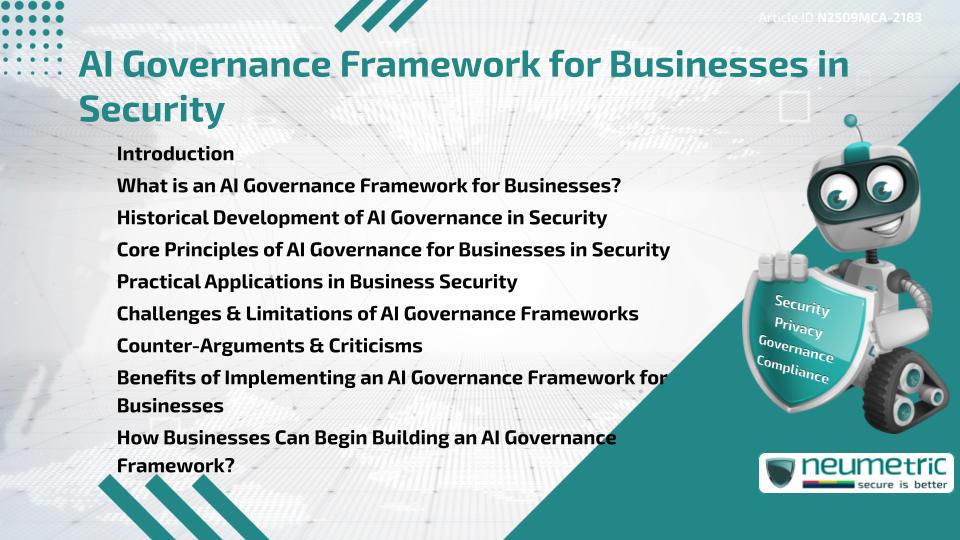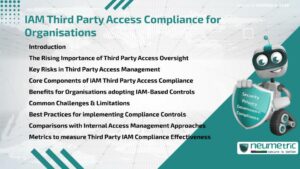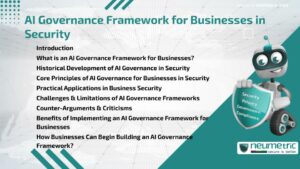Table of Contents
ToggleIntroduction
An AI Governance Framework for businesses is a structured approach that helps Organisations manage, monitor & secure the use of Artificial Intelligence within their operations. In security, this Framework ensures that AI-driven tools follow ethical guidelines, comply with regulations & minimise Risks such as bias, misuse & Cyber Threats. Businesses rely on such frameworks to strengthen accountability, build trust with Stakeholders & avoid reputational harm. By combining oversight, technical safeguards & transparent Policies, companies can use AI responsibly while protecting both data & people.
What is an AI Governance Framework for Businesses?
An AI Governance Framework for businesses refers to the rules, processes & guidelines that help Organisations responsibly manage AI Systems. Much like corporate Governance ensures ethical Financial reporting, AI Governance ensures safe & fair AI deployment. It addresses issues such as Data Privacy, decision transparency, security Risks & compliance with laws. Without such a Framework, businesses Risk exposing themselves to Vulnerabilities that could damage Customer Trust & regulatory standing.
Historical Development of AI Governance in Security
The concept of AI Governance emerged as Artificial Intelligence shifted from research labs into real-world business applications. Early AI Systems raised questions about fairness & accountability, especially in Financial services & Healthcare. Over time, security Risks became more apparent, such as adversarial attacks on machine learning models. Organisations & governments introduced guidelines to regulate responsible AI use, giving rise to structured Governance frameworks. For example, international discussions at institutions like OECD, NIST & Council of Europe helped formalise Global Standards.
Core Principles of AI Governance for Businesses in Security
An effective AI Governance Framework for businesses is built on key principles:
- Accountability – Organisations must ensure human oversight for AI-driven decisions.
- Transparency – AI processes & outcomes should be understandable to Stakeholders.
- Security – Systems must be protected from cyberattacks & misuse.
- Fairness – Algorithms should avoid bias & discrimination.
- Compliance – Businesses must align with local & international regulations.
These principles act as safeguards that prevent irresponsible use & build confidence among customers & regulators.
Practical Applications in Business Security
Businesses apply AI Governance in multiple areas of security. For example, companies use frameworks to:
- Secure Access Control systems powered by AI facial recognition.
- Monitor AI-driven Fraud Detection systems for fairness & reliability.
- Ensure Cybersecurity tools using machine learning resist adversarial manipulation.
- Implement clear Audit trails to investigate AI-driven Security Incidents.
Without Governance, these systems may deliver inaccurate or biased outcomes, exposing businesses to Risks. With Governance, AI becomes a reliable partner in protecting assets.
Challenges & Limitations of AI Governance Frameworks
While valuable, AI Governance frameworks for businesses are not free of challenges. They can be resource-intensive, requiring time & expertise to design & implement. Smaller businesses may struggle with cost & technical knowledge. Furthermore, over-regulation might limit innovation & slow down adoption of AI in critical areas. Finally, Governance frameworks may not fully address rapidly evolving Threats, leaving businesses vulnerable to emerging Risks.
Counter-Arguments & Criticisms
Some critics argue that strict Governance slows technological progress & reduces competitiveness. Others suggest that AI Governance frameworks add layers of bureaucracy that distract from practical security improvements. Additionally, global variations in standards can create confusion for businesses operating across multiple jurisdictions. These counterpoints highlight the need for balance between strong Governance & flexible innovation.
Benefits of Implementing an AI Governance Framework for Businesses
Despite criticisms, the benefits outweigh the drawbacks. Businesses that adopt strong Governance frameworks enjoy:
- Greater trust from customers & partners.
- Reduced Risk of cyberattacks & misuse.
- Improved compliance with international standards.
- Enhanced internal accountability & oversight.
- Long-term sustainability in AI-driven Operations.
For businesses, Governance is not just a safeguard but also a strategic advantage.
How Businesses Can Begin Building an AI Governance Framework?
Businesses can start by identifying the AI Systems most critical to their security operations. They should define Governance Policies covering Data Protection, Risk Assessments & oversight responsibilities. Engaging cross-functional teams that include legal, technical & compliance experts ensures well-rounded Governance. Finally, businesses should monitor & update their frameworks regularly to respond to evolving Risks. Helpful guidance can be found from Organisations like World Economic Forum & European Commission.
Conclusion
AI is a powerful tool for businesses in security, but without Governance it can create more Risks than benefits. By adopting structured frameworks, businesses safeguard both their systems & their reputation.
Takeaways
- An AI Governance Framework for businesses ensures safe, ethical & compliant AI use.
- Core Principles include accountability, transparency, fairness, security & compliance.
- While costly & complex, Governance delivers trust & long-term value.
- A structured approach transforms AI from a potential Risk into a security asset.
FAQ
What is an AI Governance Framework for businesses?
It is a structured set of Policies & practices that guide Organisations in using AI responsibly, particularly in security contexts.
Why do businesses need AI Governance in security?
AI Governance ensures that security systems are fair, reliable, transparent & protected from misuse or attacks.
What are the biggest challenges of AI Governance frameworks?
The main challenges include cost, expertise requirements, evolving Threats & differences in global regulations.
How does AI Governance prevent bias?
By requiring audits, transparency & oversight, Governance frameworks minimise Risks of unfair or discriminatory outcomes.
Can Small Businesses adopt AI Governance?
Yes, but smaller Organisations may need to adopt simplified frameworks or external support due to limited resources.
Does AI Governance slow down innovation?
While some argue it does, Governance actually creates sustainable innovation by reducing Risks & building trust.
Who is responsible for implementing AI Governance?
Implementation typically involves cross-functional teams including IT, compliance, legal & executive leadership.
Need help for Security, Privacy, Governance & VAPT?
Neumetric provides organisations the necessary help to achieve their Cybersecurity, Compliance, Governance, Privacy, Certifications & Pentesting needs.
Organisations & Businesses, specifically those which provide SaaS & AI Solutions in the Fintech, BFSI & other regulated sectors, usually need a Cybersecurity Partner for meeting & maintaining the ongoing Security & Privacy needs & requirements of their Enterprise Clients & Privacy conscious Customers.
SOC 2, ISO 27001, ISO 42001, NIST, HIPAA, HECVAT, EU GDPR are some of the Frameworks that are served by Fusion – a SaaS, multimodular, multitenant, centralised, automated, Cybersecurity & Compliance Management system.
Neumetric also provides Expert Services for technical security which covers VAPT for Web Applications, APIs, iOS & Android Mobile Apps, Security Testing for AWS & other Cloud Environments & Cloud Infrastructure & other similar scopes.
Reach out to us by Email or filling out the Contact Form…





